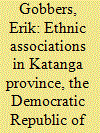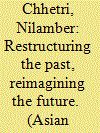| Srl | Item |
| 1 |
ID:
145962


|
|
|
|
|
| Summary/Abstract |
This article unravels the world of ethnic associations in Katanga that emerged as a result of rural–urban migration. These associations constitute a multi-tier system reflecting ethnic, provincial and national identity levels. Primarily meant to organise mutual aid and foster cultural values, they have behaved as interest groups since democracy was re-established in the 1990s. Representing ethnic communities, they try to influence the distribution of spoils through lobbying activities, emphasising the right of ‘autochthons’ to be prioritised regarding employment and development. Political and socio-economic changes trigger identity shifts and ethnic associations adapt by inventing alternative ‘autochthony’/‘allochthony’ dichotomies, causing friction between communities. The multi-tier system provides forums where ethnic differences can be negotiated and ethnic communities can integrate. In its current manner of functioning it is only effective at mitigating acute crises. In order to resolve more complex political issues, it would benefit from a preventive approach within a permanent framework of consultation between associations and authorities.
|
|
|
|
|
|
|
|
|
|
|
|
|
|
|
|
| 2 |
ID:
152998


|
|
|
|
|
| Summary/Abstract |
This article is an empirical investigation into the recent demands made by ethnic groups for recognition as scheduled tribes (ST) in Darjeeling. These demands emerged in the early 1990s after the publication of the Mandal Commission Report and escalated in subsequent years. During the course of this study in 2014 there were 10 ethnic groups demanding recognition as ST. In recent years the developmental strategy adopted by the state government through the constitution of development boards for groups such as Lepcha, Tamang, Sherpa, and Bhutia has caused further escalation of these demands. Discussing these multifarious issues in Darjeeling, this article traces the historical legacy of these demands and discusses in detail formation of ethnic associations and their claims in recent time. Examining the interactions between ethnic associations and government agencies, this article will provide an empirical account of ethnic politics in Darjeeling and the response of the state in containing such demands made by ethnic minorities.
|
|
|
|
|
|
|
|
|
|
|
|
|
|
|
|